新概念英语青少版2A:Unit 12 The London bus 课件(39张PPT)
文档属性
| 名称 | 新概念英语青少版2A:Unit 12 The London bus 课件(39张PPT) |

|
|
| 格式 | zip | ||
| 文件大小 | 1.9MB | ||
| 资源类型 | 教案 | ||
| 版本资源 | 新概念英语 | ||
| 科目 | 英语 | ||
| 更新时间 | 2019-06-19 10:28:56 | ||
图片预览

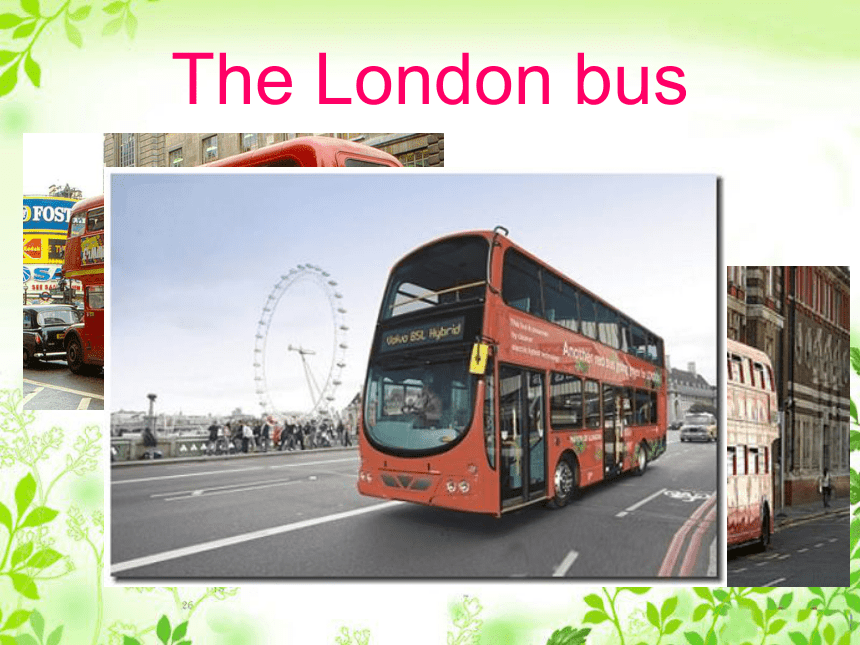
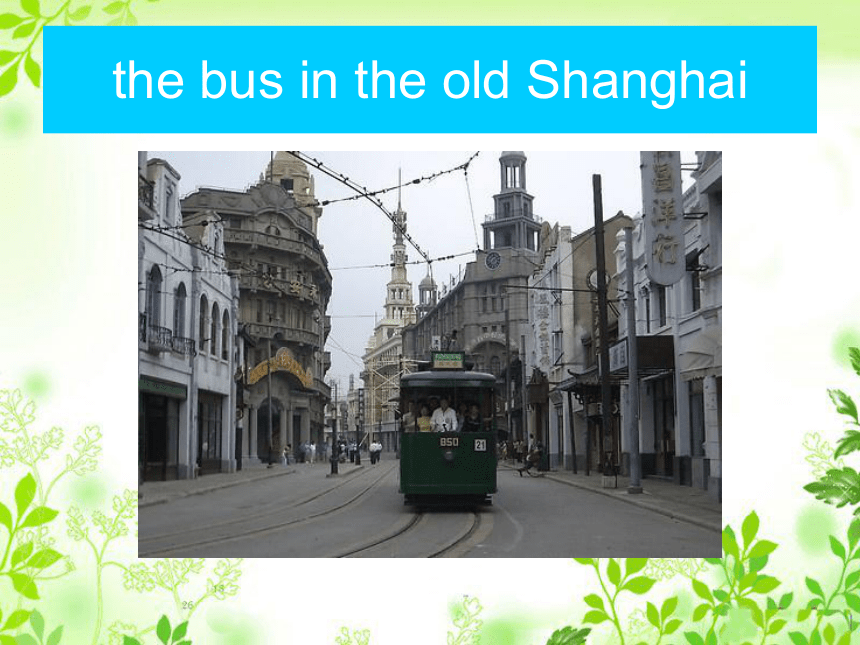


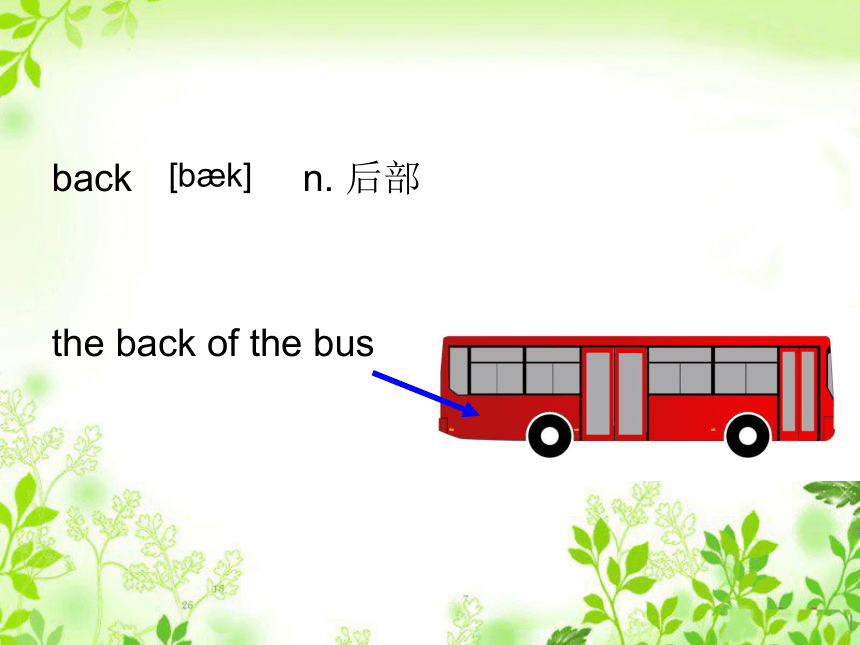
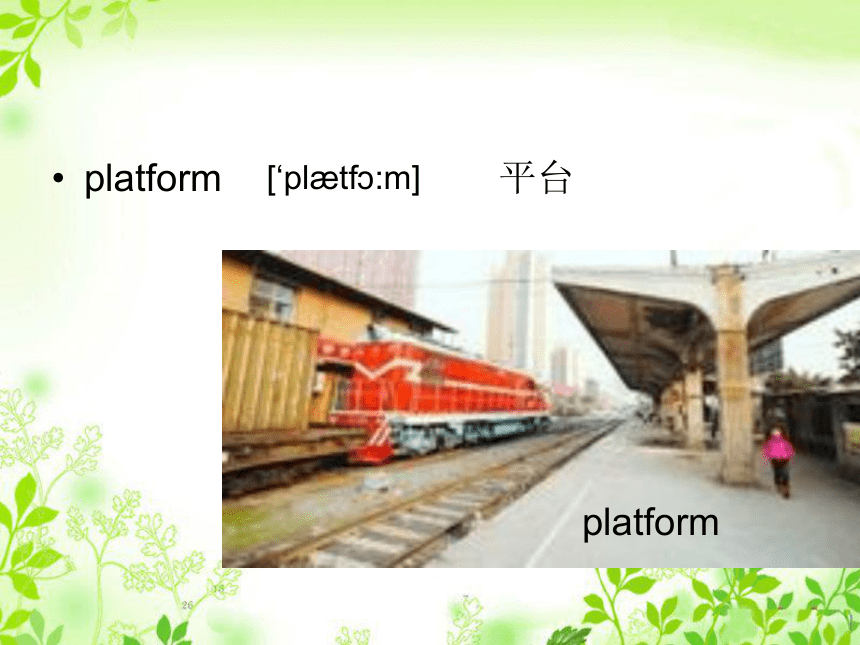
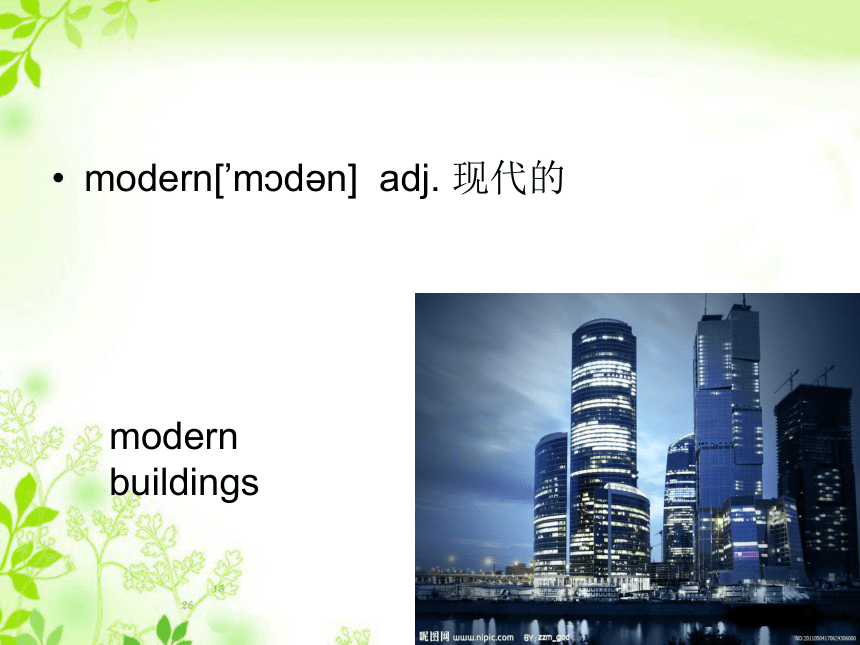
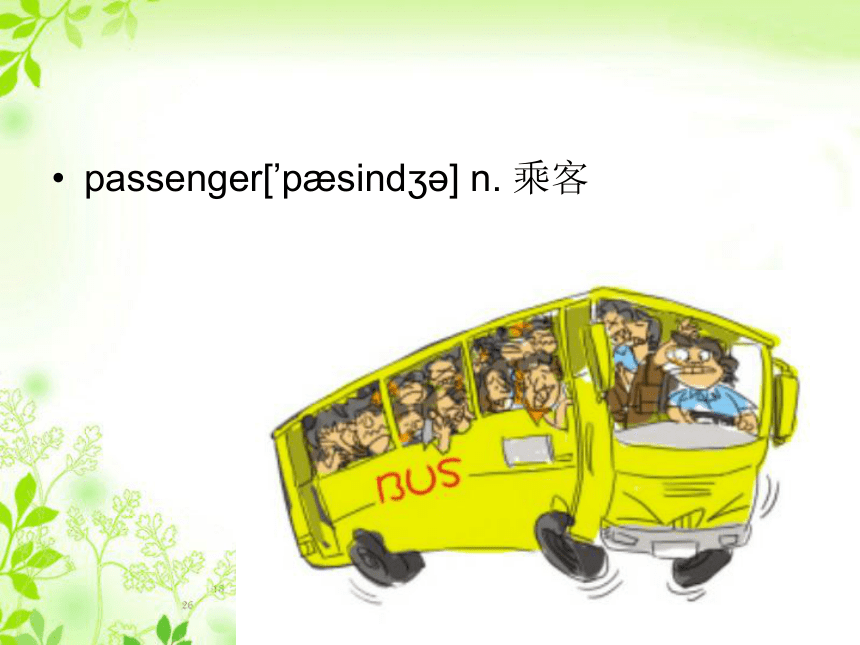
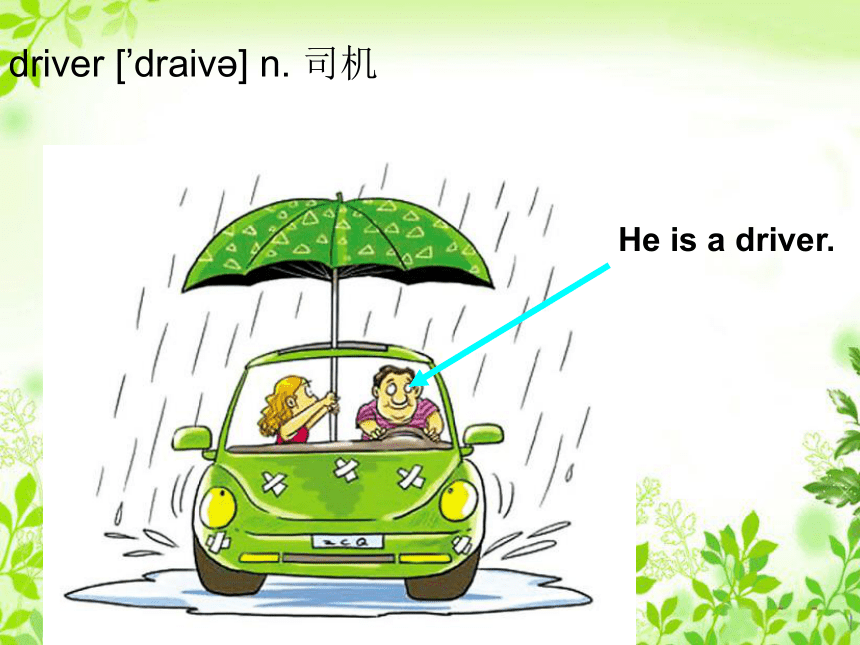
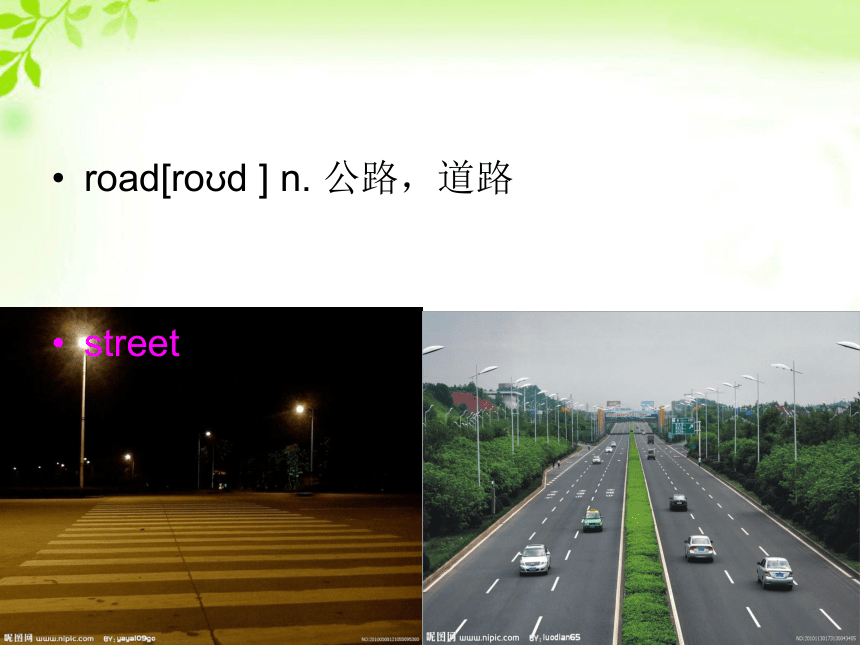

文档简介
课件39张PPT。Unit 12 The London busThe London busthe bus in the old Shanghaireal [ri?l] adj. 真正的
It is real.
It is a picture.design classic [di’zain ] [ ’kl?sik] n.经典设计
designer 设计师back n. 后部
the back of the bus [b?k]platform 平台[‘pl?tf?:m]platformmodern[’m?d?n] adj. 现代的modern buildingspassenger[’p?sind??] n. 乘客driver [’draiv?] n. 司机He is a driver.road[ro?d ] n. 公路,道路
street [stri:t ] 街道official[?’fi??l] adj.
官方的,正式的journey[’d??:ni] n.
旅行,旅程
Route n.
路线 [ru:t]ago adv.
以前[?‘ɡ?u]a hard time
困难的日子around [?’raund] prep. 到处,各处routemaster
some times ago
real and official
modern passenger
Journey on the road
the back of the platform
The designer has many design classic.
The drivers around here have a hard time.
TranslateTry it根据汉语说出英语单词.单词记忆大比拼根据英语说出汉语意思.Listen and fill in the blanks. The new buses in London are just “buses”. They aren’t ‘ London buses’. The real ‘London bus’ was the old Routemaster. This was our favourite bus for fifty-one years. It was a design classic.
Were Routemaster really dangerous? The back of the bus was an open platform with no doors. Perhaps this wasn’t very safe — but Londoners like to do their own things. And the Routemaster were fast in the traffic.
Moden buses are safe,but they are slow. passengers hate the doors. Car drivers hate the buses. The bus driver have a hard time.
The first Routemaster were on our roads in 1954. The last official Routemaster journey was on Route Number 9,on 15th February 2006.That was some years ago.
Today , Londoners remember the Routemaster’s name. They remember the designer’s name: Douglas Scott.
The new buses don’t have a name. How can we love them?
Read loudlyThe text The new buses in London are just “buses”. They aren’t ‘ London buses’. The real ‘London bus’ was the old Routemaster. This was our favourite bus for fifty-one years. It was a design classic.
Unit 12 The London busNotes on the Textin, 通常后接大的地点,或者是时间,如:世纪,年,月;也可以跟早、下、晚。
e.g: in 1985/ in the morning
提示:当早、下和晚前有修饰词时,要用on 代替 in。
e.g: on a fine morning/ on saturday evening
for, 介词,这里表示“在一段时间内”。 Were Routemaster really dangerous? The back of the bus was an open platform with no doors. Perhaps this wasn’t very safe — but Londoners like to do their own things. And the Routemaster were fast in the traffic.
Unit 12 The London bus副词,用来修饰形容词dangerous转折连词Notes on the Textthe back of the bus, 是名词所有格。
通常我们用of来连接两个没有生命的物体,来表示其属性。在of 前是小部分,of 后是大的部分。
e.g: the playground of the school
the windows of the room
do one's own thing (非正式)做自己爱做的事,按自己的意愿行事
e.g: Don't bother me, you'd better do your own
thing! Moden buses are safe,but they are slow. passengers hate the doors. Car drivers hate the buses. The bus driver have a hard time.Unit 12 The London busadj.困难的hate 一般用法:hate to do/hate doing
e.g: I hate going to the theatre. (强调状态)
I hate to come in the middle (强调动作)
The first Routemaster were on our roads in 1954. The last official Routemaster journey was on Route Number 9,on 15th February 2006.That was some years ago.
Unit 12 The London busNotes on the Texton our roads in 1954,当地点状语和时间状语同时出现时,通常将地点状语放在时间状语前。
on,用在具体的某一天
e.g: on 15th February 2006
in,用在年和月的前面
e.g: in February 2006
some years ago, ago 通常和表示一段时间的词或短语连用,表示“在...之前” Today , Londoners remember the Routemaster’s name. They remember the designer’s name: Douglas Scott.
The new buses don’t have a name. How can we love them?
Unit 12 The London busPractise saying some years1900
1805
1936
1999
2000
2001
2012 nineteen hundrednineteen hundred and fivenineteen thirty sixnineteen ninety —ninetwo thousandtwo thousand and onetwo thousand and twelvePattern practice按要求转换句型
1.He was at home a week ago .
(一般疑问句)
2. My father doesn’t like playing tennis.
(变为肯定句)
3.I was at the railway station a short time
ago .
(否定)
4.We were at the butcher`s yesterday.
(一般疑问句)
5. Tim has a gold watch. (变为一般疑问句)
6.They were at the cinema.(提问)
7.play sports every morning. (变为否定句)
8.Polly was at a party .(提问)
Thank you
It is real.
It is a picture.design classic [di’zain ] [ ’kl?sik] n.经典设计
designer 设计师back n. 后部
the back of the bus [b?k]platform 平台[‘pl?tf?:m]platformmodern[’m?d?n] adj. 现代的modern buildingspassenger[’p?sind??] n. 乘客driver [’draiv?] n. 司机He is a driver.road[ro?d ] n. 公路,道路
street [stri:t ] 街道official[?’fi??l] adj.
官方的,正式的journey[’d??:ni] n.
旅行,旅程
Route n.
路线 [ru:t]ago adv.
以前[?‘ɡ?u]a hard time
困难的日子around [?’raund] prep. 到处,各处routemaster
some times ago
real and official
modern passenger
Journey on the road
the back of the platform
The designer has many design classic.
The drivers around here have a hard time.
TranslateTry it根据汉语说出英语单词.单词记忆大比拼根据英语说出汉语意思.Listen and fill in the blanks. The new buses in London are just “buses”. They aren’t ‘ London buses’. The real ‘London bus’ was the old Routemaster. This was our favourite bus for fifty-one years. It was a design classic.
Were Routemaster really dangerous? The back of the bus was an open platform with no doors. Perhaps this wasn’t very safe — but Londoners like to do their own things. And the Routemaster were fast in the traffic.
Moden buses are safe,but they are slow. passengers hate the doors. Car drivers hate the buses. The bus driver have a hard time.
The first Routemaster were on our roads in 1954. The last official Routemaster journey was on Route Number 9,on 15th February 2006.That was some years ago.
Today , Londoners remember the Routemaster’s name. They remember the designer’s name: Douglas Scott.
The new buses don’t have a name. How can we love them?
Read loudlyThe text The new buses in London are just “buses”. They aren’t ‘ London buses’. The real ‘London bus’ was the old Routemaster. This was our favourite bus for fifty-one years. It was a design classic.
Unit 12 The London busNotes on the Textin, 通常后接大的地点,或者是时间,如:世纪,年,月;也可以跟早、下、晚。
e.g: in 1985/ in the morning
提示:当早、下和晚前有修饰词时,要用on 代替 in。
e.g: on a fine morning/ on saturday evening
for, 介词,这里表示“在一段时间内”。 Were Routemaster really dangerous? The back of the bus was an open platform with no doors. Perhaps this wasn’t very safe — but Londoners like to do their own things. And the Routemaster were fast in the traffic.
Unit 12 The London bus副词,用来修饰形容词dangerous转折连词Notes on the Textthe back of the bus, 是名词所有格。
通常我们用of来连接两个没有生命的物体,来表示其属性。在of 前是小部分,of 后是大的部分。
e.g: the playground of the school
the windows of the room
do one's own thing (非正式)做自己爱做的事,按自己的意愿行事
e.g: Don't bother me, you'd better do your own
thing! Moden buses are safe,but they are slow. passengers hate the doors. Car drivers hate the buses. The bus driver have a hard time.Unit 12 The London busadj.困难的hate 一般用法:hate to do/hate doing
e.g: I hate going to the theatre. (强调状态)
I hate to come in the middle (强调动作)
The first Routemaster were on our roads in 1954. The last official Routemaster journey was on Route Number 9,on 15th February 2006.That was some years ago.
Unit 12 The London busNotes on the Texton our roads in 1954,当地点状语和时间状语同时出现时,通常将地点状语放在时间状语前。
on,用在具体的某一天
e.g: on 15th February 2006
in,用在年和月的前面
e.g: in February 2006
some years ago, ago 通常和表示一段时间的词或短语连用,表示“在...之前” Today , Londoners remember the Routemaster’s name. They remember the designer’s name: Douglas Scott.
The new buses don’t have a name. How can we love them?
Unit 12 The London busPractise saying some years1900
1805
1936
1999
2000
2001
2012 nineteen hundrednineteen hundred and fivenineteen thirty sixnineteen ninety —ninetwo thousandtwo thousand and onetwo thousand and twelvePattern practice按要求转换句型
1.He was at home a week ago .
(一般疑问句)
2. My father doesn’t like playing tennis.
(变为肯定句)
3.I was at the railway station a short time
ago .
(否定)
4.We were at the butcher`s yesterday.
(一般疑问句)
5. Tim has a gold watch. (变为一般疑问句)
6.They were at the cinema.(提问)
7.play sports every morning. (变为否定句)
8.Polly was at a party .(提问)
Thank you
同课章节目录
- Unit 1 Linda comes to London
- Unit 2 Good luck on Sunday
- Unit 3 Is this yours?
- Unit 4 The top three percent
- Unit 5 All about ants!
- Unit 6 An elegant size
- Unit 7 A good example
- Unit 8 A nice quiet afternoon
- Unit 9 Do Your own thing
- Unit 10 Tomorrow's another day!
- Unit 11 We all have our troubles
- Unit 12 The London bus
- Unit 13 The kalenjin
- Unit 14 Chocolate haven!
- Unit 15 It's a mystery to me!
